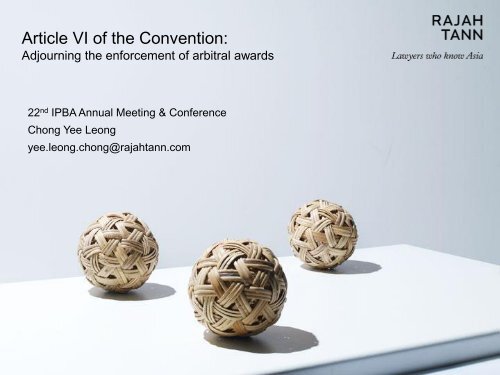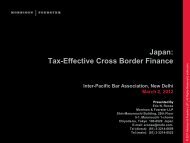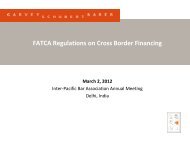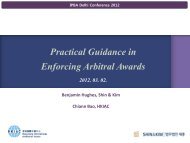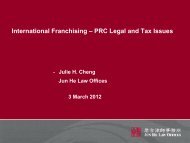Adjourning the enforcement of arbitral awards - IPBA 2012
Adjourning the enforcement of arbitral awards - IPBA 2012
Adjourning the enforcement of arbitral awards - IPBA 2012
Create successful ePaper yourself
Turn your PDF publications into a flip-book with our unique Google optimized e-Paper software.
Article VI <strong>of</strong> <strong>the</strong> Convention:<br />
<strong>Adjourning</strong> <strong>the</strong> <strong>enforcement</strong> <strong>of</strong> <strong>arbitral</strong> <strong>awards</strong><br />
22 nd <strong>IPBA</strong> Annual Meeting & Conference<br />
Chong Yee Leong<br />
yee.leong.chong@rajahtann.com
Article V (1)(e) <strong>of</strong> <strong>the</strong> Convention:<br />
Article V (1)(e):<br />
1. Recognition and <strong>enforcement</strong> <strong>of</strong> <strong>the</strong> award may be refused, at <strong>the</strong> request <strong>of</strong> <strong>the</strong> party<br />
against whom it is invoked, only if that party furnishes to <strong>the</strong> competent authority where <strong>the</strong><br />
recognition and <strong>enforcement</strong> is sought, pro<strong>of</strong> that —<br />
…<br />
(e) <strong>the</strong> award has not yet become binding on <strong>the</strong> parties, or has been set aside or<br />
suspended by a competent authority <strong>of</strong> <strong>the</strong> country in which, or under <strong>the</strong> law <strong>of</strong> which, that<br />
award was made.
Article VI <strong>of</strong> <strong>the</strong> Convention:<br />
Article VI:<br />
If an application for <strong>the</strong> setting aside or suspension <strong>of</strong> <strong>the</strong> award has been made to a<br />
competent authority referred to in Article V (1)(e), <strong>the</strong> authority before which <strong>the</strong> award<br />
is sought to be relied upon may, if it considers it proper, adjourn <strong>the</strong> decision on <strong>the</strong><br />
<strong>enforcement</strong> <strong>of</strong> <strong>the</strong> award and may also, on <strong>the</strong> application <strong>of</strong> <strong>the</strong> party claiming<br />
<strong>enforcement</strong> <strong>of</strong> <strong>the</strong> award, order <strong>the</strong> o<strong>the</strong>r party to give suitable security.<br />
[emphasis added]
Article VI <strong>of</strong> <strong>the</strong> Convention:<br />
Article VI considerations:<br />
• When is it ―proper‖ to grant an adjournment<br />
•Factors considered by different enforcing jurisdictions.<br />
• Should security be ordered to be furnished
Context in which Article VI is invoked<br />
Potentially different jurisdictions which could rule on an award:<br />
Supervisory Jurisdiction / Court<br />
(setting aside award)<br />
vs<br />
Enforcement Jurisdiction / Court<br />
(refusal <strong>of</strong> <strong>enforcement</strong>)
Context in which Article VI is invoked<br />
Potentially different jurisdictions which could rule on an award:<br />
e.g. Distinctions made in:<br />
•Far Eastern Shipping Co. v AKP Sovcomflot [1995] QB 520<br />
• Russian award / Enforcement in UK<br />
• Application to Russian Supreme Court to challenge <strong>the</strong> award.<br />
•Cour d’Appel (Sovereign Participations International S.A. v. Chadmore Developments Ltd)<br />
• Swiss award / Enforcement in Luxembourg<br />
• Application for review <strong>of</strong> <strong>the</strong> award before <strong>the</strong> Swiss Supreme Court.<br />
•Republic <strong>of</strong> Gabon v Swiss Oil Corp Int’l Arb. Rep. 3 (1988)<br />
• French award / Enforcement in Cayman Islands<br />
• Application to Court <strong>of</strong> Appeal in Paris
Applying Article VI<br />
Balance <strong>of</strong> considerations:<br />
• Facilitating <strong>the</strong> <strong>enforcement</strong> <strong>of</strong> <strong>awards</strong><br />
• Expediting dispute resolution<br />
• By not frustrating <strong>enforcement</strong><br />
• Adjournment whilst awaiting <strong>the</strong> outcome <strong>of</strong> setting aside application could delay<br />
<strong>enforcement</strong><br />
vs<br />
• Protect losing parties that have a bona fide setting-aside claim<br />
• By allowing adjournment so long as award is still open to ordinary recourse.<br />
• Potential hardship if award enforced but later set aside
Applying Article VI<br />
Options open to Court:<br />
… <strong>the</strong> court may, if it considers it proper,<br />
• adjourn <strong>the</strong> proceedings; and<br />
• (on <strong>the</strong> application <strong>of</strong> <strong>the</strong> party seeking to enforce) order <strong>the</strong> o<strong>the</strong>r party to give suitable<br />
security
Balance <strong>of</strong> considerations<br />
When is it “proper” to grant an adjournment<br />
• Courts <strong>of</strong> enforcing jurisdictions have used different approaches to Article VI:<br />
• Some <strong>of</strong> considered one or more factors to determine whe<strong>the</strong>r it is ―proper‖ to<br />
adjourn.<br />
• Australia, Belgium, Canada, <strong>the</strong> Cayman Islands, England, Germany, Hong<br />
Kong, Sweden, and <strong>the</strong> United States<br />
• Some have generally refused to adjourn, irrespective <strong>of</strong> foreign annulment<br />
proceedings.<br />
• France
Balance <strong>of</strong> considerations<br />
When is it “proper” to grant an adjournment Factors used:<br />
• 1) Convention’s goal <strong>of</strong> facilitating <strong>enforcement</strong> <strong>of</strong> <strong>arbitral</strong> <strong>awards</strong> and expediting dispute<br />
resolution<br />
• Far Eastern Shipping Co. v AKP Sovocomflot [1995] 1 Lloyds Rep 520 –<br />
―Plainly <strong>the</strong> rationale <strong>of</strong> <strong>the</strong> Convention is aimed at <strong>the</strong> <strong>enforcement</strong> <strong>of</strong> foreign<br />
<strong>arbitral</strong> <strong>awards</strong>…‖<br />
• Sovereign Participations International SA v Chadmore Developments Ltd –<br />
“[<strong>the</strong>] principle <strong>of</strong> favor arbitrandum which permeates <strong>the</strong> Convention led its<br />
drafters to promote <strong>enforcement</strong> as much as possible‖.
Balance <strong>of</strong> considerations<br />
When is it “proper” to grant an adjournment Factors used:<br />
• 2) Expected duration <strong>of</strong> proceedings in curial court – <strong>the</strong> shorter <strong>the</strong> time between<br />
adjournment and setting-aside decision, <strong>the</strong> more likely <strong>the</strong> adjournment<br />
• Republic <strong>of</strong> Gabon v Swill Oil Corporation – <strong>the</strong> Cayman Islands Grand Court<br />
granted adjournment given setting-aside decision was expected in a matter <strong>of</strong><br />
days<br />
• Toyo Engineering Corp v John Holland Pty Ltd – same reasoning<br />
• Far Eastern Shipping – same reasoning, adjournment refused in expectation<br />
<strong>of</strong> protracted foreign proceedings.
Balance <strong>of</strong> considerations<br />
When is it “proper” to grant an adjournment Factors used:<br />
• 3) Likelihood <strong>of</strong> adjournment-seeking party prevailing in setting-aside proceedings<br />
• Hallen v Angledal – Supreme Court <strong>of</strong> New South Wales refused adjournment<br />
on basis that setting-aside application had no prospect <strong>of</strong> success<br />
• Toyo Engineering v John Holland – Resisting party (to setting-aside) had an<br />
arguable case; adjournment granted<br />
• Inter-Arab Investment Guarantee Corp v Banque Arabe et Internationale d’<br />
Investissements – Brussels Court <strong>of</strong> Appeal denied adjournment on <strong>the</strong> basis<br />
that resisting party’s application had no prospect <strong>of</strong> success.<br />
• ―The appellant fails to supply <strong>the</strong> provisions <strong>of</strong> international public policy<br />
applicable in Jordan on this subject, which would make <strong>the</strong> annulment <strong>of</strong><br />
<strong>the</strong> award plausible. Hence, we deny <strong>the</strong> request founded on Art. VI <strong>of</strong><br />
<strong>the</strong> New York Convention.‖
Balance <strong>of</strong> considerations<br />
When is it “proper” to grant an adjournment Factors used:<br />
• 4) Bona fides <strong>of</strong> resisting party in commencing action in <strong>the</strong> curial court<br />
• IPCO (Nigeria) v Nigerian National Petroleum – The bona fides <strong>of</strong> <strong>the</strong> resisting<br />
party’s application was considered.<br />
• The application was found to be bona fide<br />
• Continental Transfert Technique Limited v The Federal Government <strong>of</strong> Nigeria<br />
and o<strong>the</strong>rs – delay tactics in resisting party’s application
Balance <strong>of</strong> considerations<br />
When is it “proper” to grant an adjournment Factors used:<br />
• 5) Potential hardships suffered by <strong>the</strong> parties arising from an adjournment:<br />
• Europcar Italia SpA v Alba Tours International Inc – adjournment granted on<br />
<strong>the</strong> basis that respondent would suffer extreme prejudice if award was<br />
enforced in enforcing jurisdiction but later set aside in original jurisdiction<br />
• Powerex v Alcan Inc – adjournment granted on finding that it would not cause<br />
inordinate delay or create more difficulty on <strong>the</strong> enforcing party to obtain<br />
judgment
Balance <strong>of</strong> considerations<br />
When is it “proper” to grant an adjournment Factors used:<br />
• 6) Judicial efficiency<br />
• Arab Business Consortium International Finance and Investment Co v Banque<br />
Franco-Tunisienne – English High Court held that a court should have <strong>the</strong><br />
power to consider a stay on its own motion, as it is ―consistent with <strong>the</strong> Court<br />
being entitled to consider whe<strong>the</strong>r its time should be taken up with o<strong>the</strong>r matter<br />
while <strong>the</strong>… application is pending‖.<br />
• Powerex v Alcan Inc – where it was held that it would be more convenient and<br />
efficient for an American court to decide on questions <strong>of</strong> American law relevant<br />
in <strong>the</strong> setting-aside application.
Balance <strong>of</strong> considerations<br />
When is it “proper” to grant an adjournment Factors used:<br />
• 7) International comity<br />
• Europcar Canada – Ontario Court <strong>of</strong> Justice refrained from appearing to<br />
interfere with <strong>the</strong> Italian judicial process, given that one <strong>of</strong> <strong>the</strong> issues was<br />
deemed to be within <strong>the</strong> exclusive right <strong>of</strong> <strong>the</strong> Italian court to determine<br />
• IPCO (Nigeria) v Nigerian National Petroleum – adjournment granted on <strong>the</strong><br />
basis that <strong>the</strong> award was a Nigerian domestic award between domestic<br />
parties, and due deference was to be given to <strong>the</strong> local courts to decide on <strong>the</strong><br />
matter <strong>of</strong> its validity
Security<br />
How to determine amount <strong>of</strong> security<br />
• Various approaches:<br />
• Entire award<br />
• Percentage <strong>of</strong> award<br />
• Grounds for refusal:<br />
• Unnecessary due to substantial assets <strong>of</strong> resisting party<br />
• Unjust as it would gravely injure party seeking adjournment


